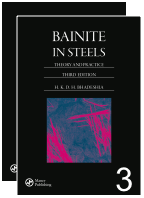
5th edition
published 2024

Free download

Free download

Available

Free download
Published 2021

Free download
![[Queen Mary University of London]](https://www.phase-trans.msm.cam.ac.uk/QMUL.png)

Functional materials represent those specifically designed to exhibit unique and often tuneable physical or chemical properties in response to external stimuli. They are valued for their `function' -- their ability to perform a specific task or change their behaviour under certain conditions. They can change their shape, electrical conductivity, magnetic properties, colour, or other characteristics when exposed to temperature, pressure, electric fields, magnetic fields, light, or chemical changes. Materials with electrical conductivity between that of a metal and an insulator are the basis of electronics. Long-chain molecules too have functionalities, including flexibility and charge mobility. Ordered arrangements of molecules can be useful in optics. Inorganic, non-metallic solids such as ceramics can be exploited for properties like piezoelectricity, and for elevated temperature service.
Some functional materials can exhibit several of these properties simultaneously, leading to sophisticated applications. Variety can be nurtured by controlled synthesis, doping, or structuring over a range of length scales.
This short book serves as an introduction, providing sufficient and complete coverage of concepts suitable for a final year undergraduate course. It includes worked examples to aid understanding and is designed for third-year students across a range of disciplines, including materials science, engineering, chemical engineering, physics, chemistry, Earth sciences, and general physical sciences. For those wishing to explore the topics in greater depth, references are provided at the end of each chapter.
 5th edition published 2024 |
 Free download |
 Free download |
 Available |
 Free download Published 2021 |
 Free download |
 Free book Hard copy |
 Free download |
 Published 2025 |
| PT Group Home | Materials Algorithms |